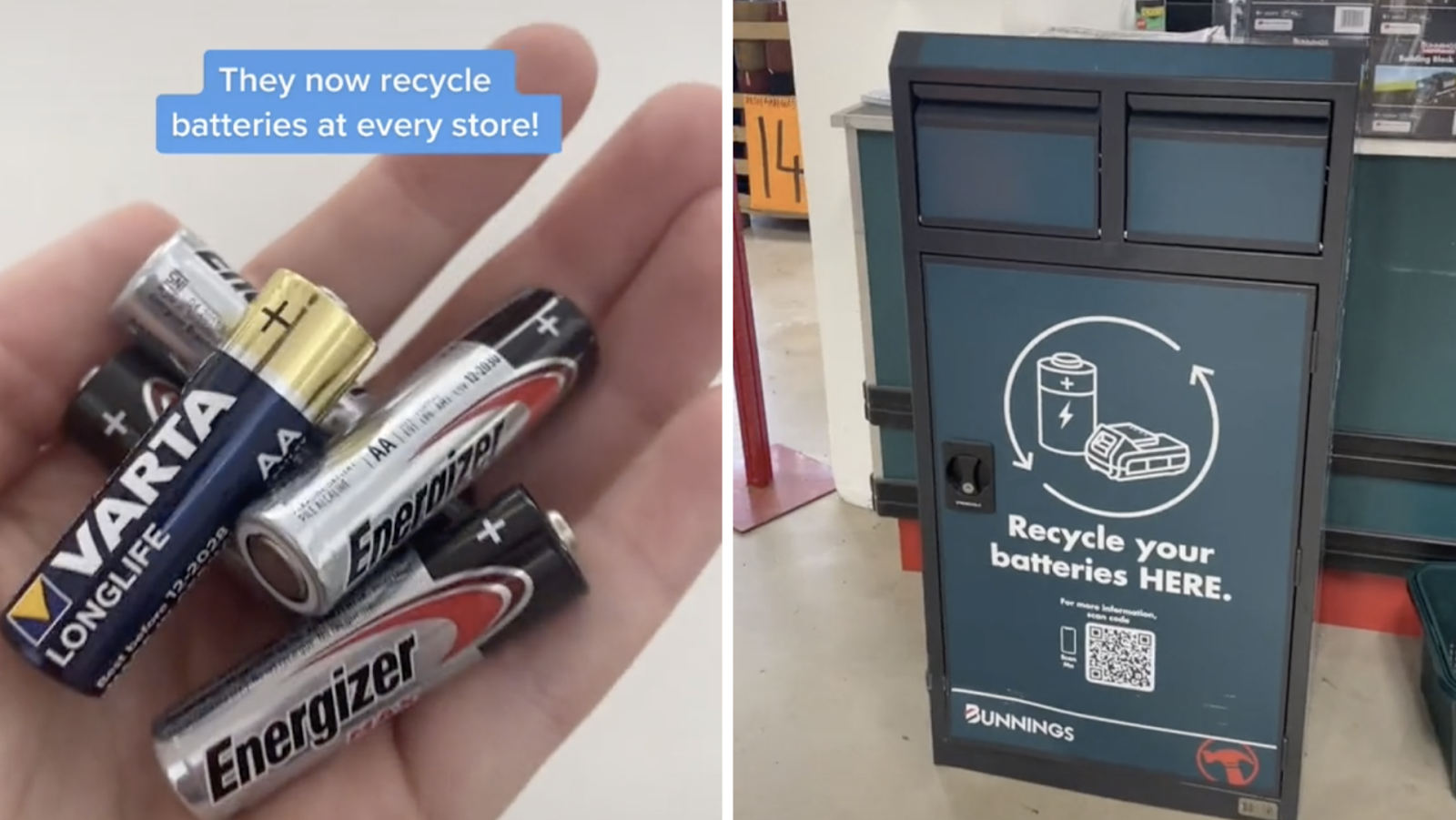Bunnings now offering FREE battery recycling service
- Replies 17
Batteries are our unsung heroes. We turn to them to power almost everything in our homes, from children’s toys to cameras and remote controls, even our vehicles and emergency devices.
And while these little fellas may be easily forgotten or disregarded after serving their purpose, we think that they deserve proper disposal. Or to be recycled, at least.
Thankfully, Bunnings has announced that as part of a new scheme, they are more than happy to take our old batteries.

Bunnings has launched a new service that gets rid of our unused batteries. Credit: TikTok/@lottiedalziel.
Starting late last year, Bunnings stores all over the country are now offering a free battery recycling service. Customers just have to bring their unused batteries at home and drop them off in the designated bins in-store.
Apparently, 95 percent of battery components can be reused, so in a bid to encourage their customers to recycle instead of contributing to more electronic waste, Bunnings has launched the battery recycling program.
Jen Tucker, Bunnings director of merchandise, said the program aims to deliver a “full circle” to the life cycle of batteries. Since the hardware company sells a wide variety of batteries, ranging from household to power tools, they’re hoping to keep the harmful materials “out of the environment” and for them to be “infinitely recycled” instead.
The recycling bins are now available at all Bunnings stores, making this project the country’s largest battery recycling program. Envirostream Australia is managing the collection, which is expected to recycle around 240,000 kilograms worth of batteries in the first year alone.
Batteries are made from toxic materials and may cause harm if they are to leak, or become fire hazards in our homes.
So, this might just be the best time to clear out your old batteries. Here are some tips to get you started:
And while these little fellas may be easily forgotten or disregarded after serving their purpose, we think that they deserve proper disposal. Or to be recycled, at least.
Thankfully, Bunnings has announced that as part of a new scheme, they are more than happy to take our old batteries.
Bunnings has launched a new service that gets rid of our unused batteries. Credit: TikTok/@lottiedalziel.
Apparently, 95 percent of battery components can be reused, so in a bid to encourage their customers to recycle instead of contributing to more electronic waste, Bunnings has launched the battery recycling program.
Jen Tucker, Bunnings director of merchandise, said the program aims to deliver a “full circle” to the life cycle of batteries. Since the hardware company sells a wide variety of batteries, ranging from household to power tools, they’re hoping to keep the harmful materials “out of the environment” and for them to be “infinitely recycled” instead.
The recycling bins are now available at all Bunnings stores, making this project the country’s largest battery recycling program. Envirostream Australia is managing the collection, which is expected to recycle around 240,000 kilograms worth of batteries in the first year alone.
Batteries are made from toxic materials and may cause harm if they are to leak, or become fire hazards in our homes.
So, this might just be the best time to clear out your old batteries. Here are some tips to get you started:
- Batteries often end up in junk drawers and boxes, so take your time to turn them inside out and reorganise them. Not only will you find used batteries, but probably a lot of other cool stuff you forgot you had!
- Check all of your electrical appliances, both small and large, in every room of your home. Even those devices that we often forget, such as smoke detectors, old calculators, worn-out watches, old phones, even devices as small as a musical greeting card.
- Store used batteries in a box in a dry place at room temperature. Do not use a metal box as they may cause short circuits.
- Do not store your batteries next to an oven, and certainly NOT in the refrigerator (as some battery storage “tips” would say!). Temperature fluctuations and excessive humidity will lead to battery content imbalances.
- Separate your discarded batteries from the new ones, perhaps making use of labels to avoid confusion.
- Do not leave your batteries in electrical devices that you will not be using for a long time.
- Do not store batteries and button cells in a pillbox. Because of their size and shape, they can easily be mistaken for medicines, and batteries are extremely dangerous and toxic when swallowed.







